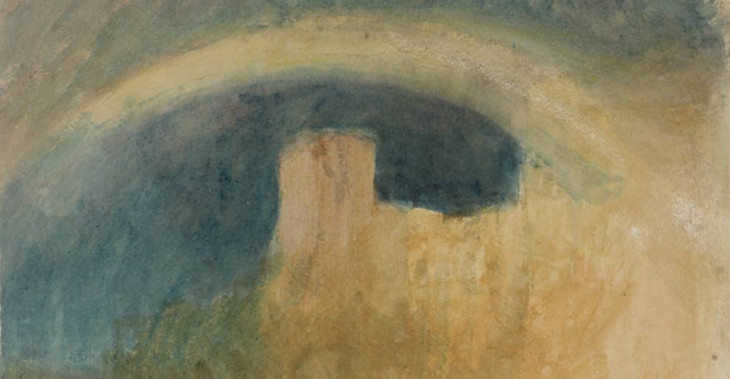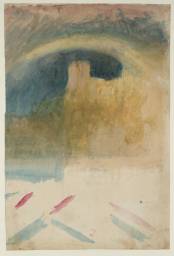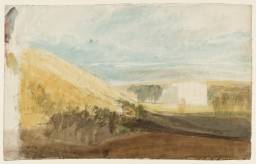Colour Studies Relating to ‘The History and Antiquities of the County Palatine of Durham’ by Robert Surtees c.1817

From the entry
This section comprises a pair of colour studies, or ‘colour beginnings’, as termed by A. J. Finberg, the first cataloguer of the Turner Bequest, thought to be related to Turner’s 1817 tour of Durham and Northumberland. For a full itinerary of this tour, see the introduction to the relevant section of the present catalogue by Matthew Imms. In 1817 Turner was commissioned by Lord Darlington to make a painting of Raby Castle: he toured County Durham and Northumberland in the autumn to gather material. He had first visited Durham and the surrounding area in 1797 as part of a tour of northern England, when he madea group of drawings of the city. He would pass through the area again both before and after his 1817 visit. Turner exhibited the oil painting resulting from Lord Darlington’s commission (Walters Art Gallery, Baltimore) at the Royal Academy in 1818 and subsequently reworked it following criticism of the hunting element of the scene. Turner also completed a watercolour of Raby, a castle dating ...
References
This section comprises a pair of colour studies, or ‘colour beginnings’, as termed by A. J. Finberg, the first cataloguer of the Turner Bequest,1 thought to be related to Turner’s 1817 tour of Durham and Northumberland. For a full itinerary of this tour, see the introduction to the relevant section of the present catalogue by Matthew Imms.
In 1817 Turner was commissioned by Lord Darlington to make a painting of Raby Castle: he toured County Durham and Northumberland in the autumn to gather material. He had first visited Durham and the surrounding area in 1797 as part of a tour of northern England, when he madea group of drawings of the city. He would pass through the area again both before and after his 1817 visit. Turner exhibited the oil painting resulting from Lord Darlington’s commission (Walters Art Gallery, Baltimore)2 at the Royal Academy in 1818 and subsequently reworked it following criticism of the hunting element of the scene.
Turner also completed a watercolour of Raby, a castle dating back to the fourteenth century, which was engraved in the second volume of The History and Antiquities of the County Palatine of Durham (London, 1820). The first volume of this publication by Robert Surtees, a local historian, had neglected to include illustrations of the ‘castles and other residences of gentlemen’ who financially supported to scheme, hence the watercolour of Raby Castle. John Bowes, the Earl of Strathmore, commissioned three further watercolours from Turner for this publication to illustrate his Durham properties, two of which were subsequently engraved. These were Hylton Castle, near Sunderland, and one of two watercolours Turner made of Gibside, near Gateshead.3
One of the ‘colour beginnings’ included here is a study for the finished watercolour of Hylton Castle that was engraved for Surtees’s publication (private collection).4 The other, of Durham Cathedral, is not related to a finished watercolour or print for this series. However, as Eric Shanes and others have stated, it seems very possiblethat this ‘beginning’ was related to the History of Durham5 and so it is here categorised with the other colour study more definitely associated with the project.
There are many discussions of the ‘colour beginnings’; for a useful introduction see Eric Shanes, ‘Beginnings’ in Evelyn Joll, Martin Butlin and Luke Herrmann (eds.), The Oxford Companion to J.M.W. Turner, Oxford, 2001, pp.21–3.
Martin Butlin and Evelyn Joll, The Paintings of J.M.W. Turner, revised ed., New Haven and London 1984, pp.101–2 no.136, pl.142 (colour).
How to cite
Elizabeth Jacklin, ‘Colour Studies Relating to ‘The History and Antiquities of the County Palatine of Durham’ by Robert Surtees c.1817’, September 2016, in David Blayney Brown (ed.), J.M.W. Turner: Sketchbooks, Drawings and Watercolours, Tate Research Publication, July 2017, https://www


